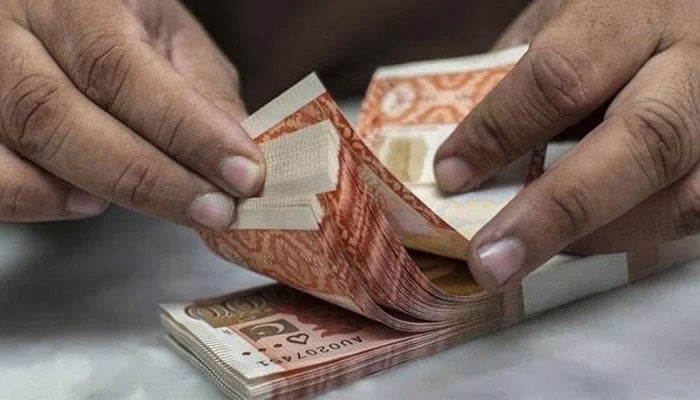Net government budgetary borrowing jumps to Rs31.13tr as of March 28
KARACHI: The government’s net borrowing for budgetary support from the banking system has surged again, highlighting its increasing spending requirements, low tax collection, weak financial inflows and necessity to finance debt servicing.
Net government budgetary bank borrowing rose to Rs31.133 trillion as of March 28, 2025, from Rs26.766 trillion by April 5, 2024, reflecting an increase of 16.31 per cent, according to central bank data on monetary aggregates released on Thursday.
The government borrowed Rs4.355 trillion from the State Bank of Pakistan (SBP) and Rs26.777 trillion from scheduled banks.Saad Hanif, head of research at Ismail Iqbal Securities, noted a significant spike in borrowing around September 2024, when it surpassed prior highs before the SBP profit transfer, indicating mounting fiscal pressure.
The fiscal borrowings amounted to Rs30.842 trillion as of September 13, 2024. The SBP reported a significant profit of Rs3.42 trillion in fiscal year 2024, compared with Rs1.142 trillion last year, driven by higher interest rates and exchange gains.
He said this time the surge in borrowings may reflect rising expenditures, delayed revenue inflows or the need to finance subsidies and debt servicing.“Although there was a slight dip following the peak, borrowings remained elevated and began climbing again into early 2025,” Hanif said.
“Overall, the trend underscores the government’s persistent reliance on banking channels for budgetary support and points to the urgent need for stronger fiscal discipline and more sustainable revenue generation,” he added.
The SBP’s data on M2, derived from weekly flows, indicated that government borrowing for budgetary support significantly decreased to Rs1.409 trillion from July 1, 2024, to March 28, 2025, in contrast to Rs4.194 trillion during the corresponding period a year earlier.
The government often borrows from banks to meet its debt obligations, using these loans to cover interest payments and principal repayments on existing debts. Lower interest rates generally reduce borrowing costs. The SBP halted its easing cycle last month, maintaining the benchmark policy rate at 12 per cent. Since June 2024, the central bank has reduced its key interest rate by 1,000 basis points (bps).
The Federal Board of Revenue (FBR) provisionally collected Rs1,120 billion during March against the assigned target of Rs1,220 billion, reflecting a shortfall of Rs100 billion. The FBR collected Rs8,464 billion during July-March FY25 against the target of Rs9,167 billion, highlighting a shortfall of Rs703 billion.
Later last month, the IMF reached a staff-level agreement with Pakistan for the first review of the ongoing $7 billion loan programme. The global lender also agreed to a new arrangement under the Resilience and Sustainability Facility (RSF). Islamabad is expected to receive $2.3 billion in two separate loans: approximately $1 billion as the second instalment of the Extended Fund Facility secured last year and $1.3 billion under the RSF, pending approval by the IMF’s executive board.
-
 NASA Celebrates One Year Of Trump’s Second Term With Moon And Mars Achievements
NASA Celebrates One Year Of Trump’s Second Term With Moon And Mars Achievements -
 Chris Pratt Shares Real Thoughts On AI In Film Industry
Chris Pratt Shares Real Thoughts On AI In Film Industry -
 Netflix Disappointed As Meghan Markle’s Series Struggles To Impress
Netflix Disappointed As Meghan Markle’s Series Struggles To Impress -
 Royal Family Announces Death Of Princess: King Releases Statement
Royal Family Announces Death Of Princess: King Releases Statement -
 Sarah Ferguson Will Continue To Be Part Of Andrew's Life
Sarah Ferguson Will Continue To Be Part Of Andrew's Life -
 Google’s Gemini Now Offers Free SAT Prep With Full-length Mock Tests
Google’s Gemini Now Offers Free SAT Prep With Full-length Mock Tests -
 Everything You Need To Know About Macron’s Viral Glasses: Cost, Model, All Details Revealed
Everything You Need To Know About Macron’s Viral Glasses: Cost, Model, All Details Revealed -
 Elon Musk Warns Of AI ‘supersonic Tsunami’: What It Means For Future
Elon Musk Warns Of AI ‘supersonic Tsunami’: What It Means For Future -
 Why Victoria Beckham's Dance Video From Brooklyn's Wedding Won't Be Released
Why Victoria Beckham's Dance Video From Brooklyn's Wedding Won't Be Released -
 Prince Harry No Longer Focused On Healing Royal Family Feud?
Prince Harry No Longer Focused On Healing Royal Family Feud? -
 OpenAI Aims To Make AI A Daily Global Tool
OpenAI Aims To Make AI A Daily Global Tool -
 Will Andrew Receive Any Royal Treatment After Title, Royal Lodge Removal?
Will Andrew Receive Any Royal Treatment After Title, Royal Lodge Removal? -
 How Your Body 'suffers' In Back Pain And Simple Way To Fix It
How Your Body 'suffers' In Back Pain And Simple Way To Fix It -
 What Victoria Beckham Really Did At Brooklyn, Nicola’s Wedding Revealed
What Victoria Beckham Really Did At Brooklyn, Nicola’s Wedding Revealed -
 Send Your Name To Moon With Nasa’s Artemis Mission: Here’s How
Send Your Name To Moon With Nasa’s Artemis Mission: Here’s How -
 Zhipu AI, MiniMax Debuts Mask Structural Hurdles For China’s Tech Giants
Zhipu AI, MiniMax Debuts Mask Structural Hurdles For China’s Tech Giants




